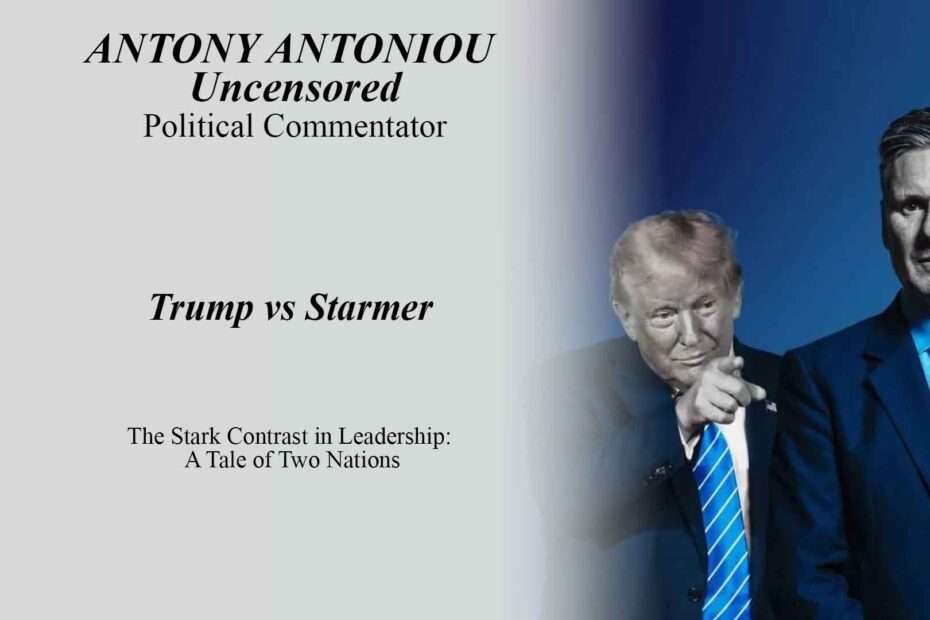Trump vs Starmer
The Stark Contrast in Leadership: A Tale of Two Nations
As the United States embraces a decisive shift towards conservative leadership, Britain finds itself in a notably different position, grappling with what many consider to be uninspiring governance. The contrast between the incoming American administration and Britain’s current leadership could hardly be more pronounced.
The American president-elect emerges as a figure of remarkable dynamism, approaching his role with unmistakable eagerness and armed with bold proposals for addressing his nation’s challenges. His forthright communication style, though occasionally unrefined, represents a refreshing departure from conventional political discourse. This direct approach to engaging with ordinary citizens, whilst perhaps lacking in diplomatic finesse, has struck a chord with many who yearn for straightforward leadership.
In stark contrast, Britain’s Prime Minister Keir Starmer presents a markedly different figure. Critics have noted his remarkably subdued presence, characterised by a distinctly bureaucratic demeanour more reminiscent of a local government official than a national leader. One must delve deep into British political history, perhaps as far back as Stanley Baldwin’s cautious “Safety First” era, to find a premier of comparable reserve.
However, the concerns extend beyond mere matters of personality. Questions of principle and integrity have increasingly come to the fore. Starmer’s record of political promises versus actual governance has raised eyebrows across the political spectrum. A particularly glaring example lies in his approach to university tuition fees. During his 2020 Labour leadership campaign, he made an unequivocal pledge to abolish these fees. Yet, in a striking reversal, his government has instead overseen their increase.
This pattern of divergence between promise and practice extends to other crucial policy areas, particularly immigration. His pledge to address the use of hotels for asylum seekers has been followed by an expansion of such facilities. Similarly, the migrant camp at RAF Weathersfield in Essex, which he previously committed to closing, is now scheduled for significant expansion under his leadership.
The incoming American president’s approach to similar challenges appears markedly different. His promises regarding border control and immigration reform carry a notable weight of conviction, suggesting a leader prepared to overcome bureaucratic resistance in pursuit of stated objectives.
In matters of international relations, historical parallels prove illuminating. The resolution of the 1980 Iranian hostage crisis serves as a pertinent example of how a change in leadership can alter international dynamics. Iran’s decision to release American hostages prior to Ronald Reagan’s inauguration demonstrated the impact that a reputation for decisive action can have on international relations.
The stark contrast between these leadership styles raises questions about Britain’s current political direction. While the American administration promises decisive action and clear direction, Britain appears to be charting a more hesitant course under its present leadership.
This disparity has led some to question whether Starmer’s premiership might conclude before its full term, though such speculation remains purely conjectural. What remains clear is that the contrast between these two approaches to leadership will likely continue to spark debate about the nature of effective governance in contemporary democracy.
Summary
Key Points: Leadership Contrasts between US and UK
New US Leadership:
• Demonstrates dynamic and proactive approach
• Known for direct, unfiltered communication style
• Shows eagerness to implement radical changes
• Projects confidence in tackling major issues like immigration
• Expected to maintain strong stance on international relations
UK Leadership under Keir Starmer:
• Characterised by subdued, bureaucratic demeanour
• Described as least dynamic leader since Stanley Baldwin
• Faces criticism over broken campaign promises:
– Reversed pledge on university tuition fees
– Failed to deliver on asylum seeker accommodation promises
– Expanded rather than closed RAF Weathersfield migrant camp
Key Contrasts:
• Leadership Style:
– US: Bold and direct
– UK: Reserved and bureaucratic
• Policy Implementation:
– US: Expected to push through promised changes
– UK: Track record of reversing campaign pledges
• Public Communication:
– US: Direct engagement with ordinary citizens
– UK: More formal, traditional approach
International Relations:
• Historical parallel drawn with 1980 Iranian hostage crisis
• Suggestion that strong leadership can influence international behaviour
• Implications for future diplomatic relations
Public Perception:
• Growing concern over UK leadership effectiveness
• Questions about potential early resignation
• Debate over contrasting governance styles

